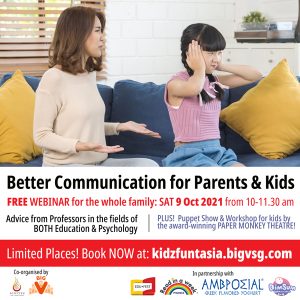Parent-Child Communication Tips from Education and Psychology Professors
My daughter is now 12, and recently, several of her friends’ parents are reporting a new pattern of behavior that’s stressing them out.
They’re finding that their children seem to be ruder, their emotions fiercer, and a few kids are even shutting themselves in their rooms and not sharing their thoughts anymore. This has left their parents flummoxed and saying, “But she used to be such a sweet girl!”
How do we communicate with our younger kids so that they’ll continue to want to chat with us, even as they enter their turbulent teen years?
I have some insights into this issue from my background as a teacher and professor of education, but I also reached out to my friend Dr. Chao–Hsiang Hung—an educational psychologist at National Taiwan University of the Arts, and also resident psychologist at MangaChat: an AI platform using comics for socio-emotional learning. (How cool is that!)—for his professional opinion.
This is a small taste of the insightful conversation we had—and will be continuing—on October 9th through our FREE Better Communication for Parents and Children webinar.
Dr. Hung: When I work with parents, there are clear do’s and don’ts in communication that I highly recommend. Let’s start with a few ideas.
First, don’t lie to kids. Be honest with them. So they can really trust what you’re telling them. So many parents lie to kids for a convenient and quick way out of a situation. In the old days, it might have been, “If you are disobedient, I’ll get the police to catch you!” Now it might be, “If you’re disobedient, I’ll give your iPad to your sister instead.” It really affects children’s sense of security, and makes them feel a sense of competition with another person, quite unnecessarily.
Me: Yes, I remember that when my daughter was very young and I had to leave her with a babysitter, when she saw me leaving, she would cry really badly. At first, I would try sneaking off without her noticing, but in the end, I chose to deliberately let her see me go, because I wanted to be honest with her and have her know that she will always know when I’m leaving and when I’m returning. After a while, she understood and adapted. Till now, even if she’s asleep and I have to leave the house, she says she would rather I let her know than just leave quietly.
Dr. Hung: Yes, and these habits of communication really do shape our relationships with our children. It’s also very important to communicate your expectations clearly. Taiwanese and it’s probably similar in Singapore, feel like they are under tremendous social pressure to make sure that their children are behaving properly in public. The nightmare is the kid rolling in the aisle of a department store because he wants a toy he can’t have. Parents I’ve worked with have found it really useful to communicate expectations ahead of time and actually rehearse the desired behaviors so that it’s clear what’s expected.
Me: Oh yes, I’m actually quite terrified when children go “boneless” and use the parents’ fear of embarrassment to get their way.
Dr. Hung: So many parents, because of the fear of embarrassment, often “punish” the kids after they leave the scene, when they get home. And by that time, the kids would have forgotten what they actually did. So all the kids learn from the “punishment” is that you, as the adult, have the power to punish without reason.
Me: What are some new phenomena you are seeing in parent-child relationships during the pandemic?
Dr. Hung: As parents, we talk about wanting to spend more time with our kids, and during the pandemic we kind of had our wish come true. BUT not in the way we imagined.
Interestingly, many of the parents in Taiwan realized that we don’t entirely know our kids all that well, and that when we are together, we are not entirely sure how to manage spending so much time together. Because once our kids have passed the toddler stage, a lot of child-care and education is outsourced. So it’s really quite a challenge that we have to suddenly “in-source” everything, including being our children’s teachers.
And we have to do this while trying to do our own jobs, and attending to our own meetings at the same time. Of course we are tearing our hair out!
Me: I’m really looking forward to continuing our chat with a LIVE audience and listening to the questions from Singaporean parents and contrasting their experiences with what’s happening in Taiwan. Do you have a question for Singaporean parents?
Dr Hung: I have heard a lot about how competitive Singapore is and how your exams give kids a lot of pressure. Taiwanese kids are also under a lot of pressure, but generally, at the primary school level, it’s actually pretty relaxed. It’s only in the 国中 (secondary school) period that it gets much more intense. In such a competitive landscape, what happens to the kids who “lose” in Singapore?
Me: Oh my… that’s a long conversation for another time.
–
Dr. Hung is full of perceptive observations, and that’s why I invited him to join me at our FREE Webinar with BigV SG on Sat 9 October. I think Singaporean parents will find the similarities and differences with the Taiwanese system to help us think out of the box. He will be speaking in Mandarin and I will translate. I’ll also be sharing some tips from expert educators. It will be an enlightening experience, so do join us and bring your questions!

